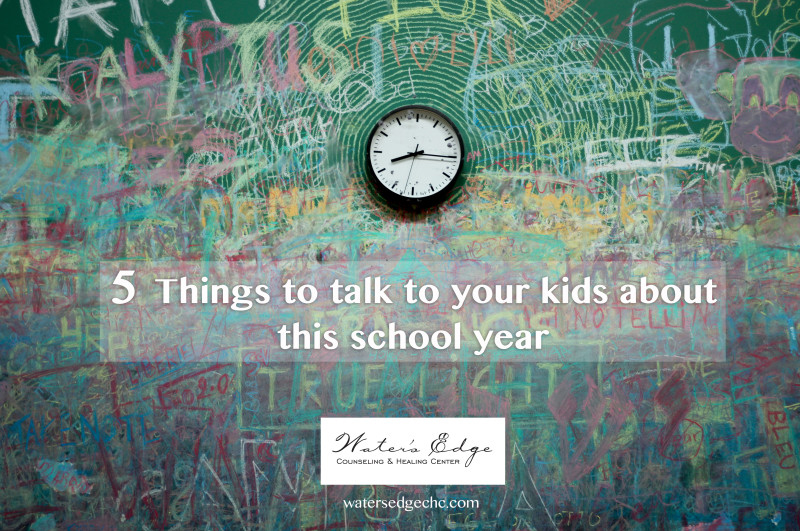By Heather Rouillard, M.A.
I have worked with teenagers for a few years now, and somehow, the beginning of the school year causes me anxiety too. Bottom line, school is stressful. Kiddos have to worry about their social life, their appearance, sports, if their friends are in their class, etc. Oh yeah, AND school. I wouldn’t want to relive it all again and I had a fairly easy going family and school schedule.
I was trained at looking at things from a systemic lens. I often sit with families for mental health assessments and ask a whole lot of questions that people normally don’t get asked from a stranger. I sat back and thought about some of the most unspoken topics I see with families, kiddos and parents. Parents, it is not that fact that you don’t know about these topics, but that you may not realize how often they are coming up or how important they are to those kiddos in your life.
I put together a quick list of 5 things I encourage you to talk to your kiddos with as school kicks off (or at anytime for that matter). There is a cheesy billboard that I read every time I drive home from my parents house in Northern Minnesota and it is a picture of a couple of kids from the 80’s and the sign reads, “Parents! Talk to us!” I have no idea who funds the billboard, but I always thought it was silly. I came from a family where we talked about everything. And, I realize more and more in family sessions that this is not always the case in other families. So, I hope this short list can pave the way for more in depth conversations in the future. It doesn’t have to a be a lecture, or something you did research on – it just has to be talked about.
1. Urgh – Bullies
There is not a single intake that I complete where a kid mentions they have never been bullied. Ever. I am still shocked by that. It makes me sad that it is happening way too frequently. I could sit here and talk about the reason, and big picture, but this is so individual for every client. Ask your kids, Were they ever bullied? If so, what did it happen? How did it affect them then? How does it affect them now? Are they still bothering you? The Center for Anti Bullying has some awesome tips and tricks and contact information if you want to learn more. But, some kids even need someone to explain to them what an actual bully does or what bullying entails. Creating space for conversations around the topic aids in kids feeling safe to speak their experience.
2. Mental Health
What is anxiety? Depression? Do you know the answer as a parent? Talking about symptoms of mental illness minimizes the stigma of mental illness tremendously. It is a difficult topic to bring up, but another necessary one. If parents can feel comfortable about talking about this topic, then kids can feel comfortable asking you for help. More and more schools are embracing mental health support in your school. Check the school site or talk to your school administration for more information. Several mental health agencies can also work with schools to help get the school to change the student’s schedule, or personalize an education plan.
3. What are your expectations & goals
What are some or your expectations as a parent for the remainder of the school year? Do you expect your kiddo to get his learner permit AND start taking Spanish? Is there a short term and long term goal? Try talking about that.
What are some goals and expectations that your kiddo has for themselves? What do they have of you? Is there a difference in short term vs. long term goals? Do they have separate personal and educational goals? Help them define them and start thinking. Maybe put together a vision board to get started.
4. Have a back up plan
Nothing is working. You are feeling stuck mid school year and don’t feel like you can talk to your kiddo. What are some signs they can give you that it’s okay to talk? Maybe a sign that they need a break for a few days but have to come full circle for 72 hours to check-in, etc. Checking in with your kiddo about the goals and expectations will be really beneficial. How can you work together to create a solution? Aligning with the kid is so important. And, getting extra help when you can’t do it yourself is always a solution too (school counselors, school teachers, therapists, etc.).
5. Have some fun!
At the end of the day, they are kids, and this is life. If things change or something unexpected happens, adjustments will need to be made. Be sure to incorporate some fun, give them space to be kiddos, and be present in those moments with them. Way too often I hear parents talking about how their kids grew up way too fast and they wished they would have enjoyed more of their time together. No time like the present. And, being mindful is the best way to handle all those intense emotions. Psychologist Peter Gray states, “…[T]he most straightforward explanation for the rise of depression and anxiety in children and adolescents is that, as a society, we have increasingly forced them into settings that make them unhappy and anxious and have deprived them of the activities that make them happy.”






